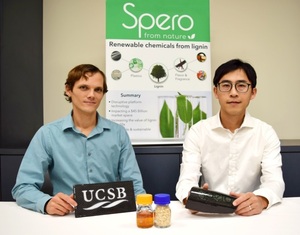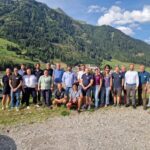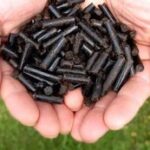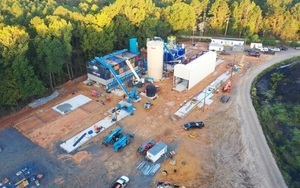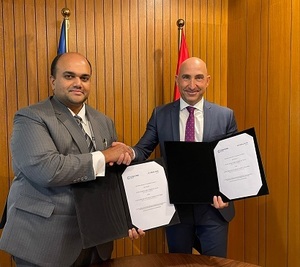Spero Renewables, INL improve biomass preprocessing
Energy Disrupter
By U.S. Department of Energy, Idaho National Laboratory | April 01, 2022
- <img src="https://biomassmagazine.com/uploads/posts/web/2022/04/resize/SperoINL1_16488445834295-300×300-noup.jpg" title="Spero researchers Dr. Ian Klein (left) and Dr. Shou Zhao (right) display bio-based composite prototypes made using biomass pre-processed at INL.
SOURCE: Spero Renewables</small>”> - <img src="https://biomassmagazine.com/uploads/posts/web/2022/04/resize/SperoINL2_16488445835325-300×300-noup.jpg" title="Dr. Ian Klein of Spero Renewables prepares pre-processed biomass from INL for upgrading to lignin-based chemicals and materials.
SOURCE: Spero Renewables</small>”>
ADVERTISEMENT
As more companies work to turn biomass, such as crop residues and municipal solid waste, into renewable fuels, products and power, they face a host of challenges. Among these challenges is how to turn raw biomass into a consistent product that is easy to handle, process and convert at a biorefinery.
Recently, researchers at Spero Renewables, a California-based green technology company, tapped into Idaho National Laboratory’s (INL) Technical Assistance Program to work with researchers at the Biomass Feedstocks National User Facility. The program provides U.S.-based small businesses with access to INL experts and unique capabilities at no cost. Spero is using environmentally friendly practices to manufacture renewable chemicals from plant-based materials.
The project helped the company build upon its work synthesizing fiber-reinforced polymers using their proprietary technology called SperoSet. This technology is designed for the manufacture of high-tech plastics produced from lignin, a class of organic polymers found in most plants, and is used to make fiber-reinforced polymers. These high-tech plastics are as strong as steel, the company says, but are lightweight and developed from surplus wood. These materials can be used in automotive, aerospace and other applications where high strength and low weight is necessary.
Through the lab’s Technical Assistance Program, Spero researchers received help preprocessing biomass samples to turn the surplus wood into a desired starting ingredient.
From raw material to finished good: The preprocessing process
Preprocessing involves drying, chopping, grinding, roasting, densifying or otherwise preparing raw biomass to create uniform material that is easier to handle, store and convert to biofuels, biopower or bioproducts. The U.S. Department of Energy’s Bioenergy Technologies Office recently invested in upgrades to INL’s Biomass Feedstock National User Facility to add functionality that will meet the needs of companies like Spero. Additionally, INL’s experience in biomass preprocessing and characterization made it possible to help Spero produce biomass feedstocks to the company’s specifications. The lab also pinpointed important variables such as particle size, composition and flowability by consulting feedstock data from the Bioenergy Feedstock Library.
“Partnering with INL on the preprocessing allowed us to focus our limited resources on creating the best process for making chemicals from plants,” said Ian Klein, the chief technology officer at Spero. “With INL, we were able to develop preprocessing technology on a lab scale. Now, as we are planning to scale up our production process using metric tons of biomass, we are realizing the significance of this partnership.”
“When you look at what petroleum is used for – from food flavorings to plastics – the technology we have developed will produce the same materials with the same great properties, Klein continued. “The bigger idea here is to do this better and be more sustainable while asking how much carbon dioxide we are reducing through the plant-based process that we are developing.”
Inside biomass research at INL
INL’s Biomass Feedstock National User Facility offers technology and expertise to help the U.S. bioenergy industry overcome challenges during scale up and integration of biomass preprocessing facilities. The User Facility capabilities include a full-scale, fully integrated Process Development Unit. The feedstock preprocessing plant’s modular design allows industry partners to customize process flows and insert third-party equipment to pilot a range of biomass preprocessing options.
Unlike grain or coal — which flow through machinery easily and are relatively consistent — biomass can vary widely in characteristics such as moisture content, ash content, particle size, compressibility and chemical composition. This variability can cause a range of challenges from dry matter loss during storage to clogged equipment and increased wear during preprocessing to poor yields during conversion.
The Biomass Feedstock National User Facility is designed to overcome these challenges by turning biomass and municipal solid waste into flowable, chemically consistent materials that are easily converted to biofuels and bioproducts. The facility’s capabilities are not readily available in the private sector and were beyond Spero’s research and development abilities. Additionally, INL gives private researchers space and time to explore hypotheses with the aim of producing economic and environmental impacts, said Luke Williams, a biomass preprocessing researcher at INL.
“Spero applied to the Technical Assistance Program looking to utilize our specific skills, instruments and equipment,” Williams said. “And we have everything that they need for their work. It’s great that Spero was able to have access to this world-class technology, and we are able to meet their very specific needs. Their expertise is on the chemical conversion side while INL provides preprocessing expertise. It always feels good to help new technologies reach their potential by assisting with often overlooked preprocessing challenges.”
Helping businesses realize their goals
INL’s Technical Assistance Program provides 40 hours of technical assistance to a variety of small businesses, municipalities and nonprofits. Ryan Bills from INL’s Technology Deployment office helps connect companies with the program. While the program assists between six to nine small businesses a year, he hopes more will take advantage of the quick infusion of technical support from INL.
“One of the things we are trying to do is to bring the Technical Assistance Program to a wider audience,” Bills said. “All of our researchers enjoy the opportunity to work with businesses to help them realize their goals.”
Through the Technical Assistance Program, INL has supported a variety of regional projects, including a Pocatello company that needed battery testing for portable solar power units, an Aberdeen company that needed help isolating protein from Alfalfa and a Teton Valley, Idaho nonprofit that needed geothermal research for a community pool.

